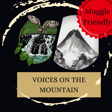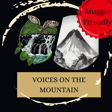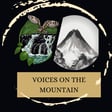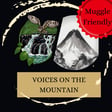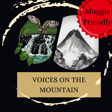Become a Creator today!Start creating today - Share your story with the world!
Start for free
00:00:00
00:00:01

Stress Part III
Is stress always good or bad?!? According to TCM, what kinds of stress should be on our radar and what is the way to navigate these stresses for optimal health? The TCM answers to these questions might surprise you!
Tune in, practitioners and muggles alike, for a deep dive into this key element of a healthy lifestyle!
Transcript
Managing Stress: The Role of Breaks
00:00:08
Speaker
Oh, so when we're thinking about to give people some guideposts and stuff for psychological stress, some key points here would be like, well, one huge one from a Chinese medicine perspective is breaks. Stress is great. It doesn't matter if it's stress at your work, stress in your home or something, but breaks. You see when people don't have breaks,
00:00:29
Speaker
it leads to mania pretty darn fast. So that's one of the key things is psychological stress good for us? Yeah, it's great. We got to have the breaks and it's way better to have regular breaks than go work straight for like 30 days and then rest for 30 days. That's just so hard on the body. Most of us just don't put up with that very long and you can see
Impact of Disrupted Rhythms on Health
00:00:54
Speaker
it. Actually, I find pilots and flight attendants
00:00:58
Speaker
depending on their seniority, of course. Man, they really run themselves dry. I don't know if it's them choosing to do it, but their job requires it of them. It's something crazy. You only have to be at home for six hours or something before they can pull you on again and get back to your next flight. And then it's true, flight attendance or something.
00:01:21
Speaker
I think it's something like they generally only work maybe three, max four days a week or something. But you drive yourself into the ground for four days. It doesn't really matter how much you rest on those three days. So the idea would be kind of consistency would be a lot more ideal. And when it comes to how we see them wearing down their body and check out the flight attendant and probably pilot category, I don't know if the demands are the same on them.
00:01:48
Speaker
But a lot of flight attendants, especially, and night nurses, both of these ones, they are just so prone to a lot of dermatological conditions, which tells you just how much they're stressing their circadian rhythm, their liver, and just weighing themselves down and generating a lot of blood heat.
00:02:04
Speaker
Totally. Well, I was going to say too, with the long stress, long break, you're probably long stressing while you're having excessive standing or whatever, and then you're long resting and you're excessively lying down or sitting on the other end.
00:02:20
Speaker
Cause you know, you're like, I need this break. I need to like lie down, but you're still lying down too much for, for the day kind of thing. Um, you're absolutely right. You're still deficient from overdoing it on the other way. Totally. It's like trying to catch up with sleep, right? Like don't sleep for three days and then just try and sleep all you need for those three days and one night. No, this doesn't work. And even if it did work, you'd be throwing your circadian rhythm. So out of whack, it wouldn't really help.
00:02:47
Speaker
Chinese medicine loves that regular circadian rhythm. I know, I feel like all of us go through that period in our 30s where we're like, how come, like when I go out and stay up till 2 a.m., I still wake up at like my 6 a.m. wake up time or something like that. It's actually a good thing. First of all, it helps us not do that too much, I guess.
Aging and Stress: Insights from Athletes
00:03:04
Speaker
But from a Chinese medicine perspective, we actually want our body to know when to wake up because, and if that's regular, then it means our liver is more regulated.
00:03:14
Speaker
Right. Yeah. I was, I don't know who you're talking about when you're talking about staying up late in your 30s. Yeah. Once there's like the one time you're like, I'm going to go see my favorite musician now. Right. Well, and talking about like, we did in the beginning of the podcast of athletes coming back to a sport. It's like, I'm 30, whatever. Like I used to be able to do this. Come on, body. Like just do it, do it again for me. And the body is like, we don't do that anymore.
00:03:44
Speaker
Yeah, I mean there's a lot and that's just like you said that great the athletes you see it all the time like NFL has a ton JJ Watt was an incredible defender I mean Tom Brady is like one of the you know epitomies of this it's not reasonable to be playing into your what does he go to 40 41 or something insane
00:04:02
Speaker
But I mean, yeah, if you look at how he takes care of his body, I mean, he eats so clean. He's so regular about all the stuff. Like he was like spot on about maintenance of all those things. And it's the same thing. It's like, yeah, you can do that. You just can't slack, right? You can't, you know, just go out with the boys and hang out every night. No way. That's what a 20 year old does and they still don't do great with it. Right? Totally. They think they do great with it.
00:04:31
Speaker
Yeah, because they're not comparing themselves to that 70-year-old man who could kick their ass. Right. Yeah, exactly. Exactly, Jude. Yeah, so the physiological one too, that's the idea of giving yourself the breaks in between and try not to push it to the extreme. So I think all of us have that tendency where we want to either finish that project or push through things or
Stress Addiction and Personal Identity
00:04:59
Speaker
so forth.
00:04:59
Speaker
But there is that idea where if you can't come down afterwards, so a couple key signposts would be if you can't calm down within an hour, like before bed, you know, it makes sense if you have a stressful day, you need some time to calm down. I mean, that can stem everybody's got their own thing. I remember one of my college roommates, she wasn't actually a roommate, she was just a buddy, but she would literally just stare a wall for a while. It was kind of hilarious. That was like her thing.
00:05:22
Speaker
She would just go to her dorm or something, and she told us about this. She'd just go there and stare at the wall. It's kind of cool. She wasn't watching a screen, I guess. I don't know if watching a wall is that much different, but that's her decompress. It's totally normal to need to decompress. But if it takes you two hours to start decompressing, three hours, first of all, you're going to be eating into your yin time, which is your sleeping time, your yin nourishing time. But that does tell you you're probably just pushing it too hard. And then for what?
00:05:52
Speaker
I mean, we all have work stress, but is that really your dream job? If it is, maybe it's worth it, but if it's not, it should give you some perspective.
00:06:02
Speaker
Totally. I actually have my business partner. His wife doesn't like getting acupuncture all the time because she has a very high stress job coming out of acupuncture. She's too sedated and she's like, where's my, I run off of this empty fire stress. She's like, where is that?
00:06:23
Speaker
It's not there anymore. Because we can be addicted to stress. I mean, I definitely grew up in a family that was addicted to stress. It was like a way of being and moving through the world is like, and when you meet your friends or family, it's like they would just talk about what was stressing them out all the time. I got far away from that because I didn't like it. It didn't feel good. You got an ocean away?
00:06:46
Speaker
Yeah, but I know that's how people live and they function like that. And they might not even know that they're stressed. It's just this is how they are. It's almost they identify as that person. You bet. And they might not know the difference between energy, like grounded energy or wiry energy. I mean, like a lot of those are just like, you know, Jenga buildings, you just pull out the wrong stone and then everything falls down into pathology. But just like when people are running in that wiry stress all the time.
Chinese Medicine Perspectives on Stress
00:07:15
Speaker
Yeah. Yeah. So when you have a person who comes in and they're, you know, in this stress state, obviously we're going to give them acupuncture. We're going to like,
00:07:24
Speaker
help ground them in the moment and for the next preceding hours or maybe a couple of days, however long the treatment effects are going to last. But what kind of tools do you first look to give people to deal with this kind of stress? I love it. So when it comes to like, let's just go with the ungrounded, kind of wired and tired scenario. There's some other stuff too, right? Like maybe they came out of skin problems or something else, but we'll just go with just ungrounded, feeling like they're running like an empty shell.
00:07:52
Speaker
And maybe they've acknowledged it. They're like, man, I just got sick two or three times in the last season. This doesn't feel like I'm actually sustainably able to do this. So there's a couple of key things that we would look for in that situation. Two biggies would be, when we talk about ungrounded in Chinese medicine,
00:08:12
Speaker
Two of the big ones are the top pulses, which are the lung pulse on one side and the heart pulse on the other, are those bigger than all the other pulses, because that should never be the case. We never want our top pulse to be the biggest one. We always want the middle pulse to be the biggest one.
00:08:28
Speaker
Which means if the top pulse is the biggest, either their middle pulses are weak, possible, and or their upper pulses are amped. Quite likely it's an and in that case. For these people who are running around and really wiry, it's interesting. They might be like, I need my wired energy. Where'd you put that? Give me that back. What sort of weird magical acupuncture satchel did you store that energy in?
00:08:56
Speaker
And you're like, yeah, but how are you pooping? Let's bring it back to something really real. If you really think that that was a sustainable way to be, let's check out that digestive function.
00:09:07
Speaker
Yeah, totally. And another one is just like, you can operate just as good. You just have to like, it's just going to be different. It's just going to feel different. And that's okay. Like different is okay. You came in here because things weren't working. You wanted different. So here's different. It's not going to be comfortable maybe, because it's not what you're used to. Totally. Yeah. So that's a big one is if the twin pulses are too large, meaning bigger than the guan pulses, twin pulses are the top to top. That's one kind of, um,
00:09:36
Speaker
unanchored. Another kind of unanchored is floating pulse, most notable usually in the liver. And so if you get a floating pulse in the liver and a floating pulse means you feel it really big when you set the finger on, very notably the liver will be bumping more than the other two pulses. And then you press down and it just dissipates roughly into nothing as you go down. Sometimes a little bit at the base, but just way lower. If it's truly nothing below it, then that's floating, but with what we also call no root.
00:10:07
Speaker
So, floating by nature has less root, but if it's zero root, then that's worth noting in your diagnostic notes. So, when people come in with those two conditions or kinds of this wired and tired, which are probably two of the biggest ones, Western medicine would probably talk about something like adrenal fatigue, although some Western medicine people hate that term too. I don't know what they'd call it, like cortisol, like flooding or something. Anyway, whatever they want to call it, they know this person's not working very well.
00:10:37
Speaker
you
00:10:37
Speaker
And if you see those things, then you would either descend and anchor a liver yang and put that liver yang back in. That's for that floating pulse. Or you would descend both the upper pulses. And that can be actually a couple of different things, but it always means anchoring downward. So when I say a couple of different things, I mean, like, if both the sun pulses are amped and the yang pulse, the kidney yang pulse below is not, it's really weak, then that tells you what you really need to do is not actually even strengthen this person. You need to reallocate their fire.
00:11:08
Speaker
And as you might guess, we're talking about ministerial fire right here. Okay. And get it to descend. Correct. So the goal of the ministerial fire is to physiologically nourish their own kidney. This is an interesting point.
00:11:23
Speaker
I'm sure our listeners will figure this out. I don't remember what I say most of the time. It's just my thing. I consider it like me listening to other people and not listening to myself. That's how I play it off. I just don't listen to what I'm saying, so if I ever repeat, sorry, peeps, but this is the idea that we know that basically how do we nourish kidney in? Nutrient-dense food. That's like if you're eating a really good diet, some of that nutrition density should make its way to the kidneys. That's the rough
00:11:51
Speaker
explanation of how do we nourish our own kidney. But how do we nourish our own kidney yang? The ministerial fire needs to descend and warm our own kidney yang.
Breathing and Meditation for Stress Relief
00:12:00
Speaker
Because you obviously would need a physiological way of nourishing both of those. Well, when that physiological fire from the heart gets stuck in the chest, guess what that feels like in pulses?
00:12:09
Speaker
boom in liver, I'm sorry, boom in lung and heart pulses up top, weak kidney yang pulse below. There is the other one though. There's also boom in pulses up top with kidney yin deficiency. This is another kind of heart and kidney not communicating, but it's more instead of, the previous one was more of a formula we call wendan tang. This other one is a different formula called hong mein jie du tang. I'm sorry, not hong mein jie du, it's hong mein ujiao tang.
00:12:36
Speaker
It's one man to clear the heart fire above and urge out and nourish the kidney in below. You could also use something like your body on one. That's usually very effective as well. But the key there is you're looking for lower kidney impulse and kidney on pulse. So I know that we went in a little pro bit there, but for you practitioners out there, that's a nice, that's a nice little nugget to be able to use. Nice.
00:13:01
Speaker
I feel like once every couple of weeks when I have new patients or something, something will happen in a day and I'm like, oh, like I have to teach you how to breathe because they'll be breathing just all up in their chest and I'll like have to introduce them to belly breathing. And then the rest of the day, I'll just be like, well, I'll just teach everyone how to breathe today if you don't know, if you haven't been taught because we breathe mostly in our chest. I feel like out here in the West. Oh, 100% man.
00:13:28
Speaker
Yeah. It's like a very... It's a basic kind of... What? Is it in the Yangshan kind of ideas of belly breathing, abdominal breathing? Oh, yeah. It's deep in the Yangshan. Yeah. It's like down into the lower burner of the Yangshan.
00:13:44
Speaker
Yeah, and so just to have this simple idea of how to kind of manage your physiology and your psychology all through this one practice and then the far-reaching effects it has from digestion to your emotional state. It's pretty amazing just for one simple tool.
00:14:06
Speaker
Dude, Asher, you are spot on. Actually, just yesterday, I was working with a patient, and she knows she's been dealing with anxiety for quite a long time. That's what she originally came to me with, and some things spurt more than others, especially other health issues and so forth. Anyway, long story short, the key here is I've been telling her belly breathing is part of it. We're doing some acupressure. Obviously, we do regular acupuncture and herb treatments and things.
00:14:32
Speaker
But I was during the treatment, I was telling her to belly breathe. And I showed her where to breathe to because she was I was like, Okay, can you try and breathe deeper? And she just like you said, she expanded her chest more. And I was like, Yeah, that's no, that's it. And then she's like, Okay, right. And no, I'm supposed to do belly breathing. And so I was like, so breathe in here. And she's like, Oh,
00:14:50
Speaker
I thought it was supposed to expand my belly on the out exhale. And I was like, well, that's something I guess I should say to people because you are supposed to do it like it was just so it's so not normal that some people like it's so foreign to our modern culture that some people don't recognize or know that it's expand on the inhale.
00:15:06
Speaker
Now technically there is a difference between Taoist and Buddhist breath. We don't need to go into that detail right now. But the key here is most of us just want to expand that belly to the point where it's like a good inch out from where it was originally. Maybe two. Maybe two, right? We're not trying to do beach body and abs at the same time as our deep breathing.
00:15:25
Speaker
No, you want a Buddha belly. That's the goal. That's right. I mean, exactly. It's fortuitous. But I mean, right away, just like Azure said, if you can just tie it to two things for people, and you can tie it to so many, but if you could tie it to two things from a Western perspective, calming the nervous system, like just activate that vagus nerve, it's so, so darn useful. And the second thing, like Azure said, is digestion. Our digestion relies on that rhythmic pumping of the diaphragm.
00:15:54
Speaker
Without that, it just does not work as well. I think all the practitioners will notice that from a Chinese medicine perspective, we actually attribute the pumping of the blood, that first initial pump, not to the heart. We attribute it to the lungs.
00:16:11
Speaker
When the fascinating thing is for all of you Western medicine focused people, check out how many pulmonologists, the people who work on your lungs know the circulatory system really well, cardiologists and so forth. They work hand in hand and oftentimes it's the same doctor going back and forth between those because you can't treat your lungs out knowing and understanding how to treat your heart system and so forth.
00:16:34
Speaker
So from our perspective, it doesn't matter. Yeah, that's what we call that first push, but don't also forget that that's that same push that's starting digestion and so forth. So really, really key. I mean, just so many different things. There is a lot of meditations that people can do for that. So one that I try and teach a lot of my patients is the small circle of heaven.
00:16:54
Speaker
which has been, it's also sometimes called the microcosmic orbit. You can do it in lots of different ways. There's a bunch of nuance that you could focus on, but a lot of people make it a little bit more esoteric than it needs to be.
00:17:09
Speaker
Shoot, we could even do it on an episode one of these days, but you don't need to get lost in the complexity of it. You just need to focus on a couple of key points, and then you need to use your intention to circulate your breath, and that's
Wisdom, Movement, and Health Maintenance
00:17:20
Speaker
about it. That is about it. If you can do that, you can fuel so much, so much. I've seen it. My main acupuncture master, Dr. Guo,
00:17:34
Speaker
I was blessed with tons of great teachers. My advisor was amazing. I mean, Twena acupuncture just so, so amazing. My herbs teachers, actually teacher is plural. And then acupuncture teacher is plural too. But Dr. Guo just was revolutionary in the way I thought about acupuncture and Chinese medicine.
00:17:52
Speaker
Anyway, Dr. Guo even ran us through the small circle of heaven one time. He was 80, 79, 80? Yeah, one of the two. He was a very small human. He was like 5'4 probably, just robust, rosy red cheeks, never ran out of energy. You're like, dude, how come you're 80 and we're rushing to keep up to you? He'll just walk through rooms, fixing everybody, walk back out. You're like, oh my God.
00:18:20
Speaker
just so much efficiency stuck into one small human. He's so nice, man. You can tell how well he's living his life because he's always playful. He's without a doubt. No one in their right mind would ever not say he's in the top echelon. I'm literally talking top 40 or 80 practitioners in the world of acupuncture
00:18:42
Speaker
I remember one time he came to one of this lecture thing at the biggest lecture hall at my university, which was pretty big. I think my university had about 30 or 40,000 students, which considering it's just Chinese medicine, that's a pretty big university.
00:18:57
Speaker
Yeah. Yeah. And so our largest lecture hall, we were doing this lecture conference series, and he was the second speaker that day. And so he walks up there, and he literally starts off, obviously in Chinese, he starts off with this phrase that's called banman nung fu. He's like, I'm out here. It means I'm speaking to experts, and I'm going to embarrass myself because you guys all know more than me. And he's like,
00:19:20
Speaker
I just know a little bit of acupuncture. That's what he said too. Literally, I'm not joking. The entire faculty of the acupuncture department, which was there, they all scoffed at the same time. They're like, are you serious? If you don't know acupuncture, we don't exist. We don't even count as functional humans. There's just not even a line that could connect us to there.
00:19:45
Speaker
Yeah, but Dr. Guo, you would lead us through this small circle of heaven, and it's not about complicating it. It's really just about circulating the breath with your intention. And then you basically focus on your center line. We'll do a little episode on it maybe. It can be really helpful. And again, a lot of people are overcomplicating. And it's not to say nuance is bad, but it doesn't have to be overcomplicated. And it's not esoteric really at all. But it's a great way. I mean, if you can do that for three to five breaths,
00:20:15
Speaker
you can shift so much in your physiology that fast. And he would do it. We would actually after he showed it to us, I realized every hour or two when we would be treating patients, he'd be putting in all these needles fixing incredible things that just did not think could be fixed with needles. We'd be sitting around talking and chatting and probably like eight of the students and him, he'd be sipping on his hot water or something like that.
00:20:38
Speaker
And then at a certain point, you wouldn't really notice if you weren't paying attention, he would just like stop talking for a bit. And like, we would all be chatting about something. And then, you know, two minutes goes by and he jumps back into the conversation. And then you start looking over and he's like, Oh, that's when he's clicking in to do just two or three circles in a small circle of heaven. And that's it. Every two hours, he does the same thing, right? And he's 80. And you can see what it has done for him. It's like a real shift. Nice. Yeah. Awesome.
00:21:08
Speaker
I feel like this has taken us to our last quote, which comes from the Yang Shen practices or the self-cultivation.
00:21:17
Speaker
Nice. Yep. Health cultivation, self-cultivation, whatever you want to call that. That's basically all the wellness or building or strengthening side of Chinese medicine as opposed to necessarily treating disease. We split that into two halves. Half of our medicine is focused on how do you heal people from disease and the other half is how do you strengthen and build and make yourself more robust and therefore resist disease.
00:21:42
Speaker
So anyway, yeah, there's a Yangshan quote. I'm going to have to be honest with the listeners out there. I don't know where this one came from, but it's been drilled into my head so much that I don't even have to look at the paper or anything, but it's just in the noggin. And so this one calls, it's a phrase we use in that whole Yangshan sphere. It's called Xin Yao Jing, which means your heart, which in this case really
00:22:07
Speaker
There's referencing what we would call more mind. So your mind should be calm or quiet. And your body should be moving or active. And that's really the essence. But they go on to explain why. So your heart and mind should be calm. Your body should be active. And they continue to say why. So they say, when your body is moving, you generate yang. Oh, my God.
00:22:33
Speaker
think about how much we could use this as practitioners, as muggles, as whatever. If you don't have enough yang, move, right? Move regularly, move often, move because movement generates yang. And there's a reason. That's actually why physiologically Chinese medicine says we sweat when we exercise. As we generate that internal yang, we're generating heat with it and that heat needs to be either anchored into yin or pushes fluids out of our body to cool ourselves, which is of course the sweating.
00:23:01
Speaker
So that generating of the yang is so darn important. That's how we're going to be moving. And of course, we're using our fundamental like yin, which is our food, our nourishment, our nutrition that fuels that, but that yin basis is so that we can generate more yang.
00:23:18
Speaker
And then the second half says, which means when your heart is or your mind is calm or quiet, we can therefore generate wisdom. And so, you know, you just kind of sink in and your mindset gets so enhanced and so forth. Awesome. Well, it's all about the balance. That's the Taoist way, everything in moderation.
00:23:42
Speaker
Yeah, for sure. Sometimes that's a really helpful baseline because people are like, oh, well, what should I be aiming for? Well, most of us can benefit from that idea. If you calm your mind and you move your body and you're doing those regularly, that's a pretty good recipe for longevity, long-term health, avoiding disease, and so forth.
00:24:04
Speaker
All right, Steven, take us out. Yeah, hopefully that's helpful for you guys. Basically, the general gist is stress good, too much stress bad. Try and pay attention to the signposts if they're helpful for you. When you're too out of whack, that's when you can go to a little bit stronger methods. That's when you might want to do some acupuncture, herbs, so forth.
00:24:28
Speaker
Hopefully this is helpful for that health cultivation, which hopefully is on some of your radars. We'll catch you guys next week. Yep. See you guys on the mountain. On the mountain.
